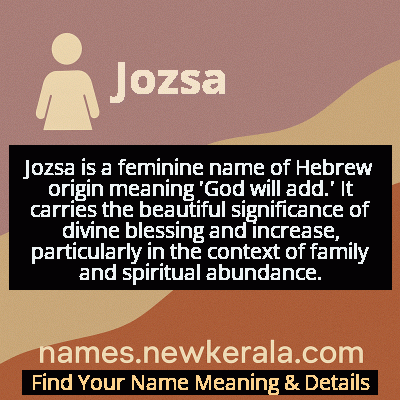Jozsa Name Meaning & Details
Origin, Popularity, Numerology Analysis & Name Meaning of Jozsa
Discover the origin, meaning, and cultural significance of the name JOZSA. Delve into its historical roots and explore the lasting impact it has had on communities and traditions.
Name
Jozsa
Gender
Female
Origin
Hebrew
Lucky Number
8
Meaning of the Name - Jozsa
Jozsa is a feminine name of Hebrew origin meaning 'God will add.' It carries the beautiful significance of divine blessing and increase, particularly in the context of family and spiritual abundance.
Jozsa - Complete Numerology Analysis
Your Numerology Number
Based on Pythagorean Numerology System
Ruling Planet
Saturn
Positive Nature
Ambitious, efficient, realistic, and authoritative.
Negative Traits
Materialistic, stressed, confrontational, and can be overly ambitious.
Lucky Colours
Dark blue, black.
Lucky Days
Saturday.
Lucky Stones
Blue sapphire, amethyst.
Harmony Numbers
2, 4, 6.
Best Suited Professions
Business leaders, managers, financial services, law enforcement.
What People Like About You
Leadership, determination, organizational skills.
Famous People Named Jozsa
Józsa Hacser
Actress
Hungarian actress known for her stage performances in Budapest theaters
Józsa Szabó
Poet
Hungarian poet and literary translator, recognized for modern verse collections
Józsa Katalin
Educator
Hungarian educator and author of pedagogical works focusing on child development
Name Variations & International Equivalents
Click on blue names to explore their detailed meanings. Gray names with will be available soon.
Cultural & Historical Significance
The name's enduring presence in Hungarian society reflects the deep connection between personal identity and cultural heritage. In folk traditions, Jozsa often appears in songs and stories as a character embodying traditional Hungarian values of family loyalty, resilience, and practical wisdom. The name's biblical roots provide a spiritual dimension while its Hungarian form grounds it in specific cultural context. This dual heritage makes Jozsa a name that represents both universal spiritual concepts and particular ethnic identity, serving as a living link between ancient religious traditions and modern cultural expression in Hungarian communities worldwide.
Extended Personality Analysis
Women named Jozsa are typically characterized by a blend of traditional values and practical intelligence. They often demonstrate strong nurturing instincts combined with remarkable resilience, able to weather life's challenges while maintaining their core values. Jozsa's tend to be deeply connected to their family and cultural roots, finding strength in tradition while adapting to contemporary circumstances. Their personality often reflects the name's meaning of 'addition' through their ability to enrich the lives of those around them with wisdom, support, and practical assistance.
In social settings, Jozsa's are known for their loyalty and reliability, often serving as the emotional anchor in their relationships. They typically possess a quiet confidence that comes from understanding their heritage and place in the world. While they may appear reserved initially, they reveal warmth and depth upon closer acquaintance. Their problem-solving approach tends to be methodical and grounded, combining intuition with practical reasoning. The combination of their Hungarian cultural background and the name's spiritual meaning often results in individuals who balance earthy pragmatism with deeper philosophical or spiritual understanding, making them valued advisors and steadfast companions.
Modern Usage & Popularity
In contemporary naming practices, Jozsa maintains a distinctive presence primarily within Hungarian communities, both in Hungary and among diaspora populations. While not ranking among the most popular names in global contexts, it enjoys steady usage among families seeking to honor Hungarian heritage or looking for names with meaningful biblical roots that stand apart from more common options. The name has seen a modest resurgence in recent years as part of a broader trend toward reviving traditional names with cultural significance. In modern Hungary, Jozsa is recognized as a classic rather than old-fashioned name, appealing to parents who value both cultural authenticity and distinctive identity for their daughters. Its usage patterns reflect the ongoing balance between preserving ethnic naming traditions and adapting to global naming trends.
Symbolic & Spiritual Meanings
Symbolically, Jozsa represents the concept of blessed increase and cultural continuity. The name embodies the idea of divine addition not merely in numerical terms but as enrichment of spirit, family, and community. It symbolizes the flow of blessings through generations, serving as a living connection between ancestral traditions and future possibilities. Metaphorically, Jozsa suggests a container for cultural memory and spiritual values, someone who preserves what matters while making room for new growth. The name also carries symbolism of resilience and adaptation, reflecting the Hungarian people's historical ability to maintain their identity through changing circumstances. As a feminine form of a traditionally masculine name, Jozsa additionally represents the transformation and flowering of strength in different forms, showing how core qualities can manifest uniquely across genders and generations.

